Unit 3 Could you please tell me where the restrooms areSection B(2a—2d)(第4课时)课件35张PPT
文档属性
| 名称 | Unit 3 Could you please tell me where the restrooms areSection B(2a—2d)(第4课时)课件35张PPT |
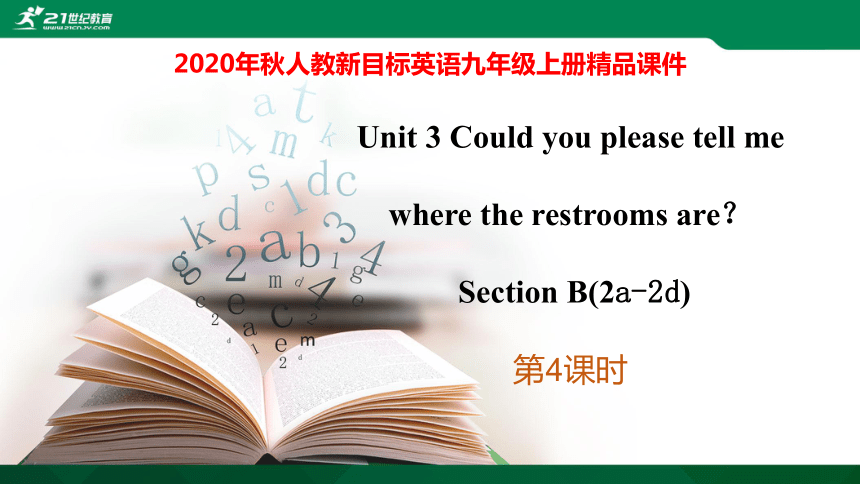
|
|
| 格式 | pptx | ||
| 文件大小 | 6.7MB | ||
| 资源类型 | 试卷 | ||
| 版本资源 | 人教新目标(Go for it)版 | ||
| 科目 | 英语 | ||
| 更新时间 | 2020-08-11 00:00:00 | ||
图片预览

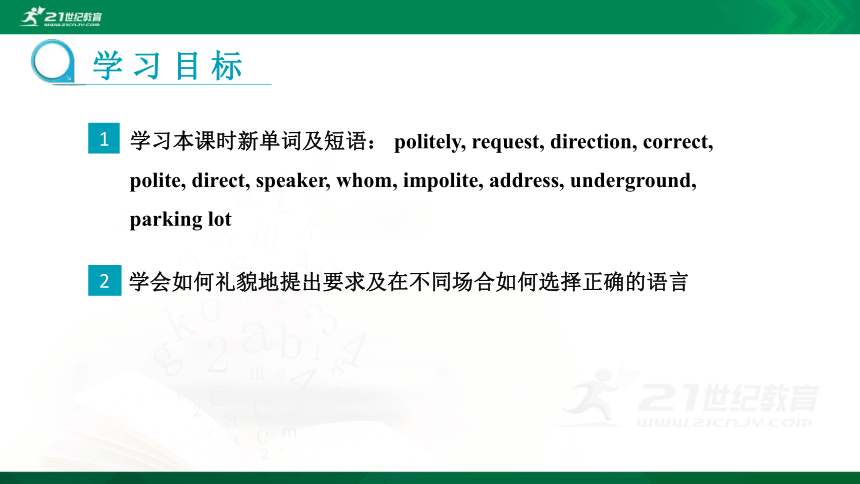
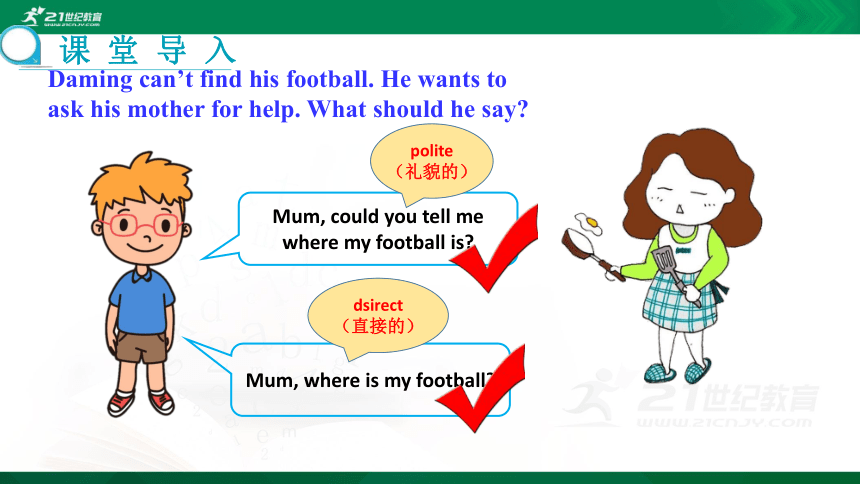
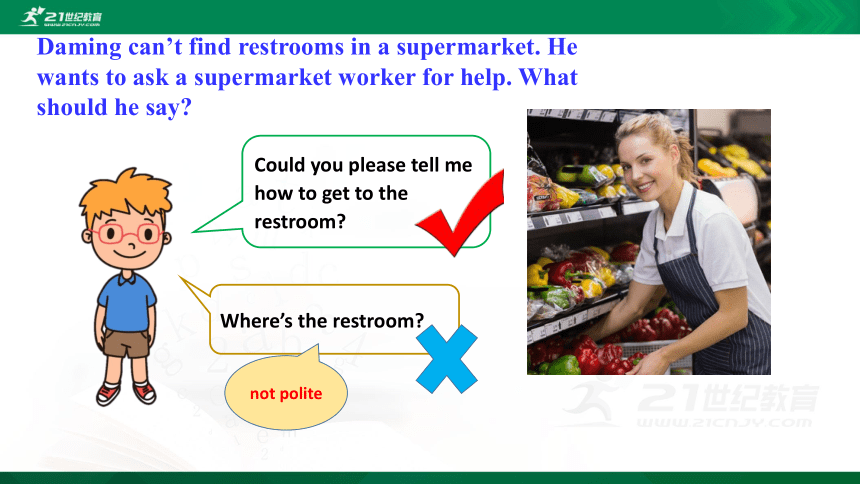
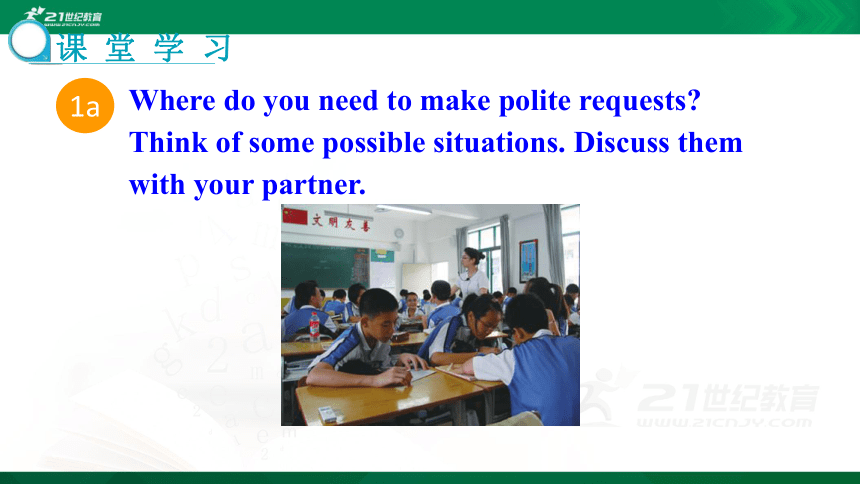
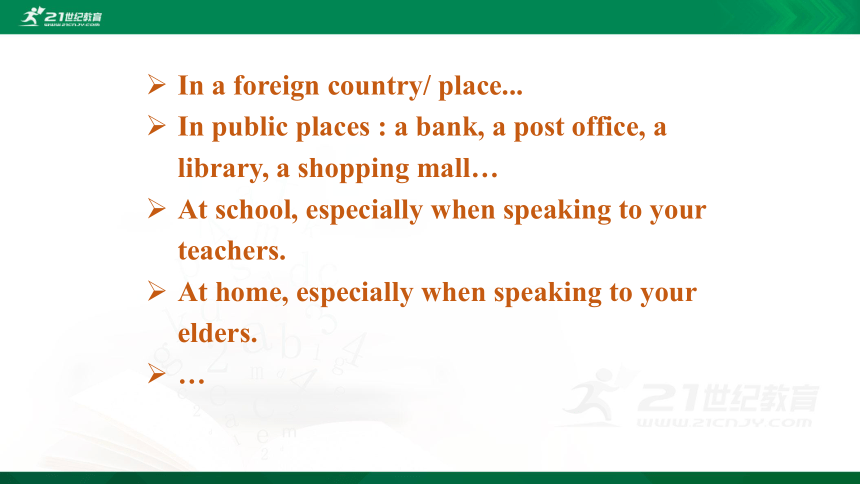
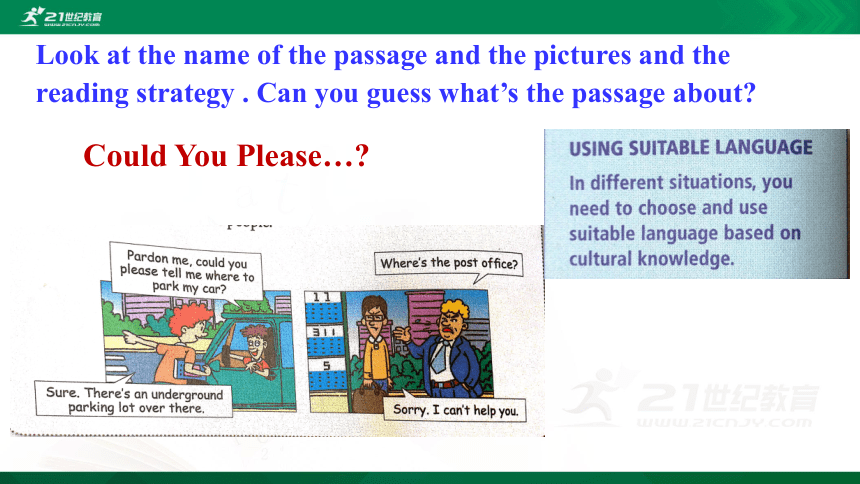
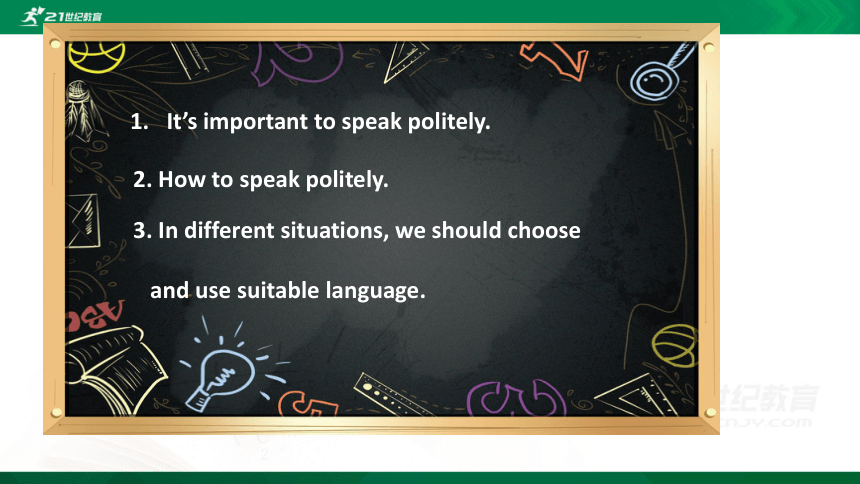
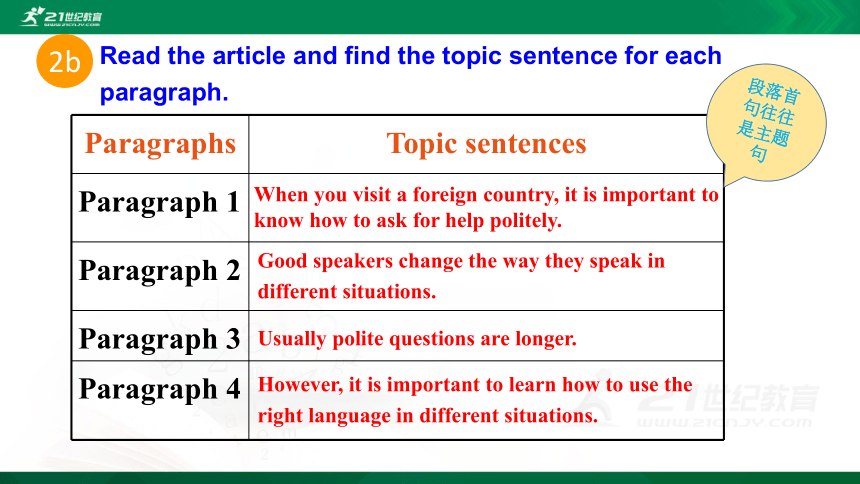
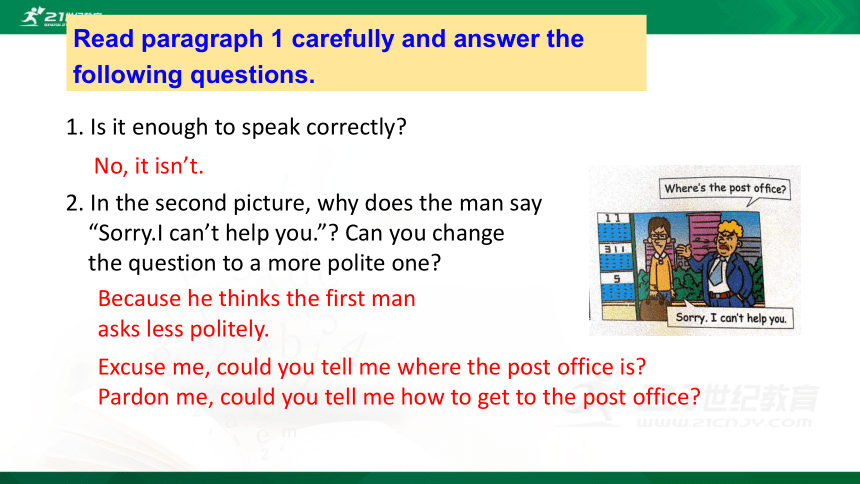
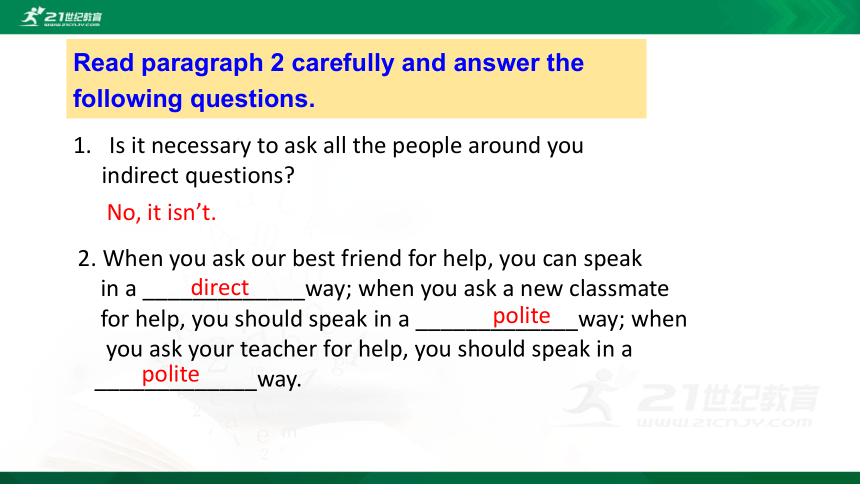
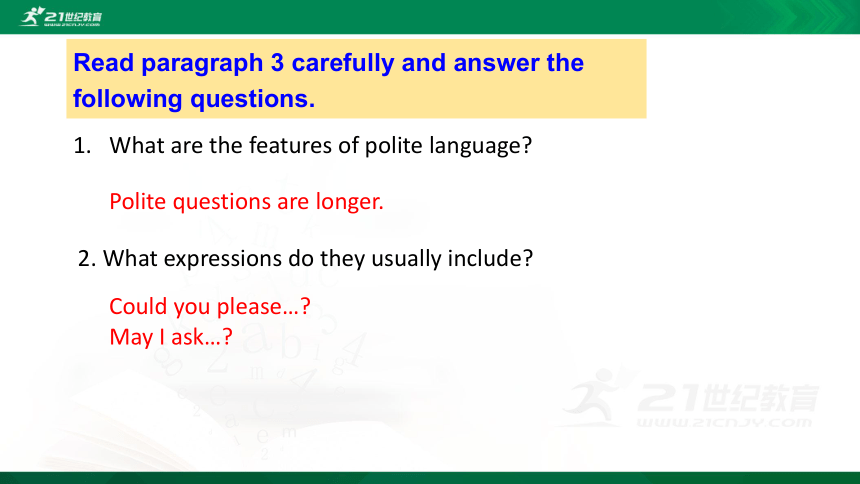
文档简介
Unit 3 Could you please tell me where the restrooms are?
Section B(2a-2d)
第4课时
2020年秋人教新目标英语九年级上册精品课件
学 习 目 标
学习本课时新单词及短语: politely, request, direction, correct, polite, direct, speaker, whom, impolite, address, underground, parking lot
1
学会如何礼貌地提出要求及在不同场合如何选择正确的语言
2
课 堂 导 入
Daming can’t find his football. He wants to ask his mother for help. What should he say?
Mum, could you tell me where my football is?
Mum, where is my football?
dsirect (直接的)
polite(礼貌的)
Daming can’t find restrooms in a supermarket. He wants to ask a supermarket worker for help. What should he say?
Where’s the restroom?
Could you please tell me how to get to the restroom?
not polite
课 堂 学 习
Where do you need to make polite requests? Think of some possible situations. Discuss them with your partner.
1a
In a foreign country/ place...
In public places : a bank, a post office, a library, a shopping mall…
At school, especially when speaking to your teachers.
At home, especially when speaking to your elders.
…
Look at the name of the passage and the pictures and the reading strategy . Can you guess what’s the passage about?
Could You Please…?
It’s important to speak politely.
3. In different situations, we should choose
and use suitable language.
2. How to speak politely.
Read the article and find the topic sentence for each paragraph.
2b
Paragraphs
Topic sentences
Paragraph 1
Paragraph 2
Paragraph 3
Paragraph 4
段落首句往往是主题句
When you visit a foreign country, it is important to know how to ask for help politely.
Good speakers change the way they speak in different situations.
However, it is important to learn how to use the right language in different situations.
Usually polite questions are longer.
Read paragraph 1 carefully and answer the following questions.
1. Is it enough to speak correctly?
No, it isn’t.
2. In the second picture, why does the man say
“Sorry.I can’t help you.”? Can you change
the question to a more polite one?
Because he thinks the first man asks less politely.
Excuse me, could you tell me where the post office is?
Pardon me, could you tell me how to get to the post office?
Read paragraph 2 carefully and answer the following questions.
Is it necessary to ask all the people around you
indirect questions?
No, it isn’t.
2. When you ask our best friend for help, you can speak
in a _____________way; when you ask a new classmate
for help, you should speak in a _____________way; when
you ask your teacher for help, you should speak in a
_____________way.
polite
polite
direct
Read paragraph 3 carefully and answer the following questions.
What are the features of polite language?
Polite questions are longer.
2. What expressions do they usually include?
Could you please…?
May I ask…?
Read paragraph 4 carefully and answer the following questions.
What’s the meaning of speaking politely?
It can help us communicate better with other people.
Listen to the tape and read after it. Pay attention to the long sentences of the passage.
Read the passage again. And then we’ll complete a text adaptation(改编).
{5C22544A-7EE6-4342-B048-85BDC9FD1C3A}Important direct difficult good correctly longer impolite well
It is not enough to just ask a question (1)_________. We also need to learn how to be polite when we ask for help.
(2)________ speakers change the way they speak in different situations. The expressions they use might depend on whom they are speaking to or how (3)__________ they know each other. For example, it is all right to ask your classmates (4)_________ questions. But it will sound (5)__________ to ask your teachers direct questions.
Polite questions are usually (6)___________ and sometimes they sound like a kind of request. It seems (7)____________ to speak politely, but it is very (8)___________ to learn how to use the right language in different situations.
correctly
Good
well
direct
impolite
longer
difficult
important
Language points
1. When you visit a foreign country, it is important to know how to ask for help politely.
politely 副词 “礼貌地,客气地”,反义词:impolitely
polite 形容词 “有礼貌的,客气的”,反义词:impolite
He?stood?up?politely?when?the lady?entered the?room.?
这位女士走进房间的时候,他有礼貌地站了起来。
It’s?polite?to speak “Please” and “Thank you”.?
说“请”和“谢谢”是有礼貌的。
副词修饰动词
形容词作表语
im-为否定前缀
2. Both are correct, but the first one sounds less polite.
“less+形容词或副词”构成降级比较形式, 意为“不那么; 稍许不……”之意。如:
他的第二部电影就没那么有趣。(翻译)
His second movie is less interesting.
3.Good speakers change the way they speak in different situations.
speaker 名词,“讲(某种语言)的人;发言者”。
=speak(动词)+-er(后缀)
许多动词后加-er/-or构成名词,表示动作的执行者。如:
write — writer teach — teacher sing — singer
visit — visitor act — actor
4.Sometimes we even need to spend time leading into a request.
spend time/money doing sth.意为“花费时间/金钱做某事”,为固定结构。如:
我花了两个小时读这本书。
I spent two hours reading the book.
spend还可与介词on构成spend time/money on sth.结构,意为“在某事/某物上花费时间/金钱”。如:
这件礼物我花了100元。
I spent 100 yuan on the gift.
拓展:
表“花费”的词还有cost, take和pay,但它们的结构句式不同。
cost 主语为物, 常用于 sth. cost sb. money结构;
take常用it作形式主语,用于 It takes sb. some time to do sth.结构;
pay主语为人,用于sb. pay some money for sth.结构。
Find the direct questions and polite requests from the passage.
2c
Direct questions
Polite requests
Where are
the restrooms?
1. Could you please tell me where the restrooms are?
Direct questions
Polite requests
2. When is the
school trip?
4. Where’s the
post office?
2. Excuse me, Mr. West. Do you
know when the school trip is?
3. Peter, could you please tell
me your e-mail address?
4. Pardon me, could you please tell me where to park my car?
3. Peter, tell me
your e-mail
address.
Read the requests below. In the second column, write A if you would say it to someone you know and B if you would say it to a stranger. In the last column, write where you think these people are.
2d
Request
Person
Place
1. Will you pass the salt?
2. Do you know where I
can change some money, please?
3. Could you tell me what just happened?
4. Can you please tell me
where the nearest station is?
A
B
A/B
B
home/restaurant
street
any public place/home
street
Request
Person
Place
5. Excuse me, do you know
what time it begins, please?
6. Let me know when you’re
ready, OK?
7. Could you possibly tell me
the way to the village
school?
movie theater
B
A
B
street
home
I.用括号中所给词的适当形式填空
1. It might seem more difficult to speak ________ (polite) than directly.
2. I think it’s ________ (polite) to keep others waiting.
3. The _____________(speak) gave us a wonderful speech.
4. Every Saturday I spend one hour ________(clean) my bedroom.
5. Excuse me, is there a ________(park) lot around here?
课 堂 达 标
politely
impolite
speaker
cleaning
parking
II.单项选择
1. Traveling around big cities by taxi can cost a lot of money, but it’s usually ________ to take the underground train to most places. ?
A. amazing????? B. expensive??
C. convenient? D. exciting
2. It is not to speak loudly in public.
A. polite B. special C. possible D. personal
3. —Many boy students think physics is geography.
—I agree. I’m weak in geography.
A. much difficult than B. as difficult as
C. less difficult than D. more difficult than
4. —What did you do last Sunday morning?
—I ________ two hours ________ books.
A.took;to read B. spend;to read
C. spent;reading D. take;read
III.根据所给提示,将下列句子翻译成英语。
1) 玛丽(Mary)对她的老师很有礼貌。(be
polite to sb.)
2) 为别人开门是礼貌的。(It’s polite to do
sth.)
3) 那个小男孩客气地向我寻求帮助。(politely)
Mary is polite to her teachers.
It’s polite to open doors for others.
The little boy asked me for help politely.
4.?这个计划取决于天气情况。?(depend on)
5.?你应该学会如何礼貌地请求帮助。?(ask for help)
6.?辛迪(Cindy)喜欢动物,比如狗,熊和猴子。?(such as)
The plan depends on the weather.
You should learn how to ask for help politely.
Cindy likes animals, such as dogs, bears and monkeys.
7.?今晚你方便来我家吃饭吗??(convenient)
8.?昨天特德(Ted)整个上午都在看报纸。?(spend)
9.?先生,很抱歉打扰你,请你给我开一下门,好吗??(trouble)
Is it convenient for you to come to my house for dinner tonight?
Ted spent the whole morning reading the newspaper yesterday.
Sir, I'm sorry to trouble you, but could you please open the door for me??
Homework
1. Review the words and expressions of this lesson.
2. Recite the article on page 22.
Thank you !
谢谢
21世纪教育网(www.21cnjy.com) 中小学教育资源网站
有大把高质量资料?一线教师?一线教研员?
欢迎加入21世纪教育网教师合作团队!!月薪过万不是梦!!
详情请看:
https://www.21cnjy.com/help/help_extract.php
Section B(2a-2d)
第4课时
2020年秋人教新目标英语九年级上册精品课件
学 习 目 标
学习本课时新单词及短语: politely, request, direction, correct, polite, direct, speaker, whom, impolite, address, underground, parking lot
1
学会如何礼貌地提出要求及在不同场合如何选择正确的语言
2
课 堂 导 入
Daming can’t find his football. He wants to ask his mother for help. What should he say?
Mum, could you tell me where my football is?
Mum, where is my football?
dsirect (直接的)
polite(礼貌的)
Daming can’t find restrooms in a supermarket. He wants to ask a supermarket worker for help. What should he say?
Where’s the restroom?
Could you please tell me how to get to the restroom?
not polite
课 堂 学 习
Where do you need to make polite requests? Think of some possible situations. Discuss them with your partner.
1a
In a foreign country/ place...
In public places : a bank, a post office, a library, a shopping mall…
At school, especially when speaking to your teachers.
At home, especially when speaking to your elders.
…
Look at the name of the passage and the pictures and the reading strategy . Can you guess what’s the passage about?
Could You Please…?
It’s important to speak politely.
3. In different situations, we should choose
and use suitable language.
2. How to speak politely.
Read the article and find the topic sentence for each paragraph.
2b
Paragraphs
Topic sentences
Paragraph 1
Paragraph 2
Paragraph 3
Paragraph 4
段落首句往往是主题句
When you visit a foreign country, it is important to know how to ask for help politely.
Good speakers change the way they speak in different situations.
However, it is important to learn how to use the right language in different situations.
Usually polite questions are longer.
Read paragraph 1 carefully and answer the following questions.
1. Is it enough to speak correctly?
No, it isn’t.
2. In the second picture, why does the man say
“Sorry.I can’t help you.”? Can you change
the question to a more polite one?
Because he thinks the first man asks less politely.
Excuse me, could you tell me where the post office is?
Pardon me, could you tell me how to get to the post office?
Read paragraph 2 carefully and answer the following questions.
Is it necessary to ask all the people around you
indirect questions?
No, it isn’t.
2. When you ask our best friend for help, you can speak
in a _____________way; when you ask a new classmate
for help, you should speak in a _____________way; when
you ask your teacher for help, you should speak in a
_____________way.
polite
polite
direct
Read paragraph 3 carefully and answer the following questions.
What are the features of polite language?
Polite questions are longer.
2. What expressions do they usually include?
Could you please…?
May I ask…?
Read paragraph 4 carefully and answer the following questions.
What’s the meaning of speaking politely?
It can help us communicate better with other people.
Listen to the tape and read after it. Pay attention to the long sentences of the passage.
Read the passage again. And then we’ll complete a text adaptation(改编).
{5C22544A-7EE6-4342-B048-85BDC9FD1C3A}Important direct difficult good correctly longer impolite well
It is not enough to just ask a question (1)_________. We also need to learn how to be polite when we ask for help.
(2)________ speakers change the way they speak in different situations. The expressions they use might depend on whom they are speaking to or how (3)__________ they know each other. For example, it is all right to ask your classmates (4)_________ questions. But it will sound (5)__________ to ask your teachers direct questions.
Polite questions are usually (6)___________ and sometimes they sound like a kind of request. It seems (7)____________ to speak politely, but it is very (8)___________ to learn how to use the right language in different situations.
correctly
Good
well
direct
impolite
longer
difficult
important
Language points
1. When you visit a foreign country, it is important to know how to ask for help politely.
politely 副词 “礼貌地,客气地”,反义词:impolitely
polite 形容词 “有礼貌的,客气的”,反义词:impolite
He?stood?up?politely?when?the lady?entered the?room.?
这位女士走进房间的时候,他有礼貌地站了起来。
It’s?polite?to speak “Please” and “Thank you”.?
说“请”和“谢谢”是有礼貌的。
副词修饰动词
形容词作表语
im-为否定前缀
2. Both are correct, but the first one sounds less polite.
“less+形容词或副词”构成降级比较形式, 意为“不那么; 稍许不……”之意。如:
他的第二部电影就没那么有趣。(翻译)
His second movie is less interesting.
3.Good speakers change the way they speak in different situations.
speaker 名词,“讲(某种语言)的人;发言者”。
=speak(动词)+-er(后缀)
许多动词后加-er/-or构成名词,表示动作的执行者。如:
write — writer teach — teacher sing — singer
visit — visitor act — actor
4.Sometimes we even need to spend time leading into a request.
spend time/money doing sth.意为“花费时间/金钱做某事”,为固定结构。如:
我花了两个小时读这本书。
I spent two hours reading the book.
spend还可与介词on构成spend time/money on sth.结构,意为“在某事/某物上花费时间/金钱”。如:
这件礼物我花了100元。
I spent 100 yuan on the gift.
拓展:
表“花费”的词还有cost, take和pay,但它们的结构句式不同。
cost 主语为物, 常用于 sth. cost sb. money结构;
take常用it作形式主语,用于 It takes sb. some time to do sth.结构;
pay主语为人,用于sb. pay some money for sth.结构。
Find the direct questions and polite requests from the passage.
2c
Direct questions
Polite requests
Where are
the restrooms?
1. Could you please tell me where the restrooms are?
Direct questions
Polite requests
2. When is the
school trip?
4. Where’s the
post office?
2. Excuse me, Mr. West. Do you
know when the school trip is?
3. Peter, could you please tell
me your e-mail address?
4. Pardon me, could you please tell me where to park my car?
3. Peter, tell me
your e-mail
address.
Read the requests below. In the second column, write A if you would say it to someone you know and B if you would say it to a stranger. In the last column, write where you think these people are.
2d
Request
Person
Place
1. Will you pass the salt?
2. Do you know where I
can change some money, please?
3. Could you tell me what just happened?
4. Can you please tell me
where the nearest station is?
A
B
A/B
B
home/restaurant
street
any public place/home
street
Request
Person
Place
5. Excuse me, do you know
what time it begins, please?
6. Let me know when you’re
ready, OK?
7. Could you possibly tell me
the way to the village
school?
movie theater
B
A
B
street
home
I.用括号中所给词的适当形式填空
1. It might seem more difficult to speak ________ (polite) than directly.
2. I think it’s ________ (polite) to keep others waiting.
3. The _____________(speak) gave us a wonderful speech.
4. Every Saturday I spend one hour ________(clean) my bedroom.
5. Excuse me, is there a ________(park) lot around here?
课 堂 达 标
politely
impolite
speaker
cleaning
parking
II.单项选择
1. Traveling around big cities by taxi can cost a lot of money, but it’s usually ________ to take the underground train to most places. ?
A. amazing????? B. expensive??
C. convenient? D. exciting
2. It is not to speak loudly in public.
A. polite B. special C. possible D. personal
3. —Many boy students think physics is geography.
—I agree. I’m weak in geography.
A. much difficult than B. as difficult as
C. less difficult than D. more difficult than
4. —What did you do last Sunday morning?
—I ________ two hours ________ books.
A.took;to read B. spend;to read
C. spent;reading D. take;read
III.根据所给提示,将下列句子翻译成英语。
1) 玛丽(Mary)对她的老师很有礼貌。(be
polite to sb.)
2) 为别人开门是礼貌的。(It’s polite to do
sth.)
3) 那个小男孩客气地向我寻求帮助。(politely)
Mary is polite to her teachers.
It’s polite to open doors for others.
The little boy asked me for help politely.
4.?这个计划取决于天气情况。?(depend on)
5.?你应该学会如何礼貌地请求帮助。?(ask for help)
6.?辛迪(Cindy)喜欢动物,比如狗,熊和猴子。?(such as)
The plan depends on the weather.
You should learn how to ask for help politely.
Cindy likes animals, such as dogs, bears and monkeys.
7.?今晚你方便来我家吃饭吗??(convenient)
8.?昨天特德(Ted)整个上午都在看报纸。?(spend)
9.?先生,很抱歉打扰你,请你给我开一下门,好吗??(trouble)
Is it convenient for you to come to my house for dinner tonight?
Ted spent the whole morning reading the newspaper yesterday.
Sir, I'm sorry to trouble you, but could you please open the door for me??
Homework
1. Review the words and expressions of this lesson.
2. Recite the article on page 22.
Thank you !
谢谢
21世纪教育网(www.21cnjy.com) 中小学教育资源网站
有大把高质量资料?一线教师?一线教研员?
欢迎加入21世纪教育网教师合作团队!!月薪过万不是梦!!
详情请看:
https://www.21cnjy.com/help/help_extract.php
同课章节目录
- Unit 1 How can we become good learners.
- Section A
- Section B
- Unit 2 I think that mooncakes are delicious!
- Section A
- Section B
- Unit 3 Could you please tell me where the restroom
- Section A
- Section B
- Unit 4 I used to be afraid of the dark.
- Section A
- Section B
- Unit 5 What are the shirts made of?
- Section A
- Section B
- Review of Units 1-5
- Unit 6 When was it invented?
- Section A
- Section B
- Unit 7 Teenagers should be allowed to choose their
- Section A
- Section B
- Unit 8 It must belong to Carla.
- Section A
- Section B
- Unit 9 I like music that I can dance to.
- Section A
- Section B
- Unit 10 You're supposed to shake hands.
- Section A
- Section B
- Review of Units 6-10
- Unit 11 Sad movies make me cry.
- Section A
- Section B
- Unit 12 Life is full of the unexpected
- Section A
- Section B
- Unit 13 We're trying to save the earth!
- Section A
- Section B
- Unit 14 I remember meeting all of you in Grade 7.
- Section A
- Section B
- Review of Units 11-14
